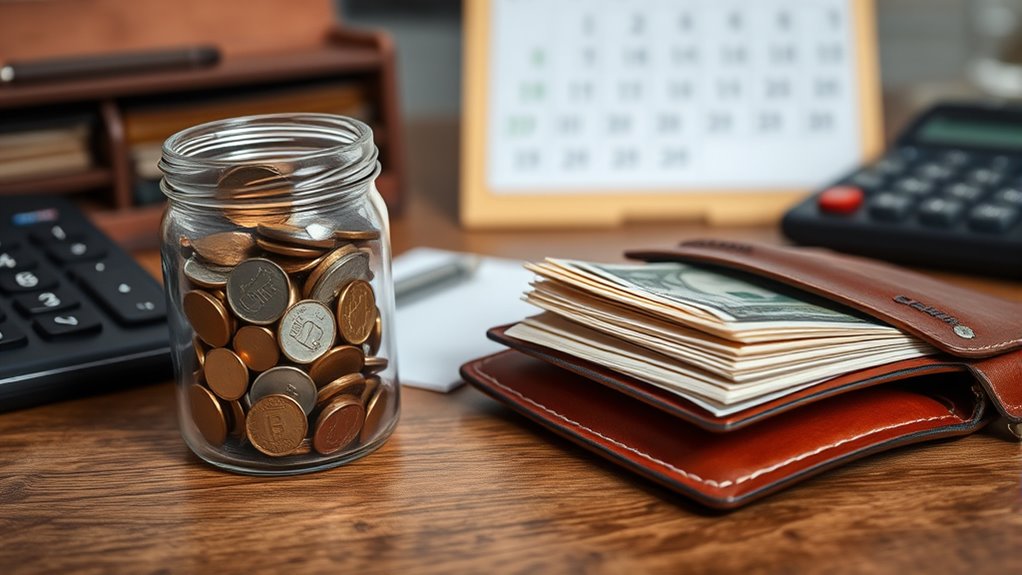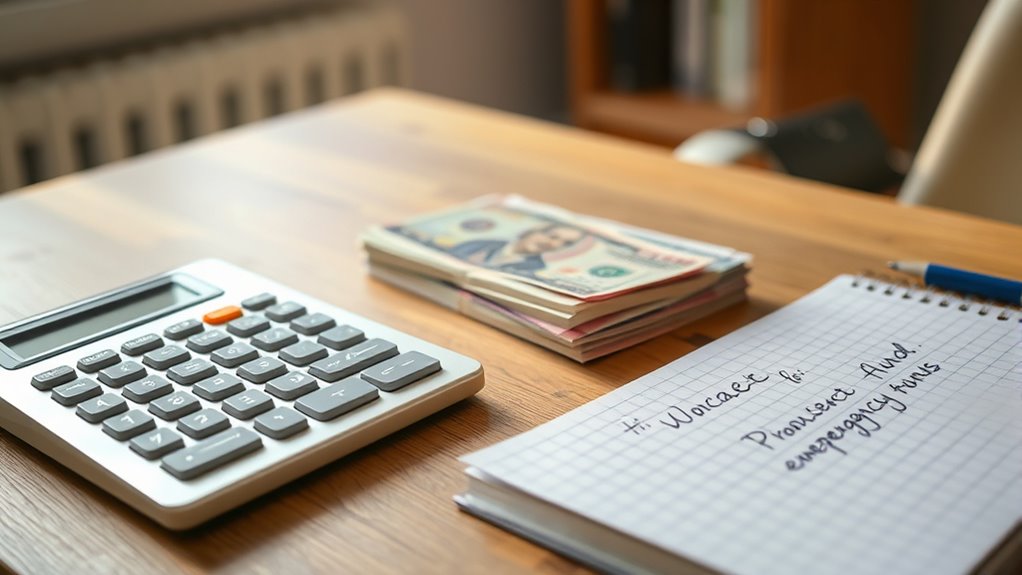Having a cash reserve and emergency fund is essential for your financial security. It provides a safety net during unexpected events like medical emergencies or job loss, helping you avoid debt and stress. Experts recommend saving enough to cover three to six months of expenses. Building and maintaining this fund smartly ensures you’re prepared for surprises. Keep exploring to discover how to create and manage your emergency fund effectively for long-term peace of mind.
Key Takeaways
- Emergency funds provide a financial safety net during unexpected expenses, ensuring stability.
- A cash reserve helps prevent high-interest debt by covering urgent costs without dipping into long-term savings.
- Maintaining an accessible emergency fund reduces stress and enhances overall financial resilience.
- Saving 3-6 months’ worth of expenses prepares individuals for job loss, medical emergencies, or other crises.
- Regularly reviewing and adjusting the fund ensures it remains aligned with changing financial needs and circumstances.
Understanding the Role of Emergency Funds in Financial Security

Emergency funds are a crucial part of your overall financial security because they provide a safety net during unexpected situations. When you prioritize building an emergency fund, you’re supporting your investment planning by ensuring that sudden expenses won’t force you to dip into long-term savings or investments. It also plays a key role in debt management, helping you avoid piling up high-interest debt if unforeseen costs arise. Having a readily accessible cash reserve allows you to handle emergencies like medical bills, car repairs, or job loss without disrupting your financial stability. This safety net gives you peace of mind, knowing you’re prepared for the unexpected and can maintain your financial goals even when life throws surprises your way. Additionally, establishing an emergency fund can help reduce stress and improve your overall financial resilience.
How Much Should You Save for Emergencies?

Most financial experts recommend saving enough to cover three to six months’ worth of living expenses. This safety net guarantees you’re prepared for unexpected events like job loss or medical emergencies without jeopardizing your financial stability. When planning your emergency fund, consider your current investment planning and long-term goals, such as retirement savings. While it might be tempting to save less, having a solid reserve provides peace of mind and flexibility. If your expenses are higher or your job is less secure, aim for closer to six months’ worth. Keep in mind that your emergency fund is separate from retirement savings, so prioritize building it before making additional investments. This approach helps you maintain balance between short-term security and long-term financial growth.
Strategies for Building Your Cash Reserve Effectively

To build your cash reserve effectively, start by setting clear, achievable savings goals based on your monthly expenses and financial situation. Next, consider implementing savings automation—set up automatic transfers to your savings account to guarantee consistency. You can also explore smart investment strategies, such as high-yield savings accounts or short-term bonds, to grow your fund without risking liquidity. Here are some tips:
Build your cash reserve by setting goals, automating savings, and exploring low-risk investments for steady growth.
- Automate your savings to stay consistent without manual effort.
- Regularly review and adjust your goals as your income or expenses change.
- Diversify your savings with low-risk investment options to maximize growth.
- Incorporate Forsale 100 options into your savings plan to potentially increase your financial flexibility.
Common Mistakes to Avoid When Managing Emergency Funds

One common mistake is failing to keep your emergency fund easily accessible, which can lead to unnecessary delays or the temptation to dip into it for non-urgent expenses. If your fund is tied up in investments or assets that are hard to liquidate, you risk facing investment pitfalls during emergencies. This delay can worsen your financial situation. Additionally, neglecting proper debt management can cause you to rely on your emergency fund for regular bills, draining it quickly. Avoid using your emergency fund for non-emergencies, as it defeats its purpose. Be disciplined about maintaining a separate, liquid reserve. Keeping your emergency funds accessible ensures you’re prepared without compromising your financial stability or falling into costly investment pitfalls. Regularly monitoring your liquidity and ensuring it aligns with your needs can help prevent these mistakes. Furthermore, understanding the importance of a Mom – Amazing Life Together can inspire you to prioritize financial security and peace of mind. Maintaining a well-planned emergency fund is essential to avoid financial setbacks during unforeseen events. Additionally, practicing mindful decluttering strategies can help you better organize and safeguard your financial documents and emergency resources.
Maintaining and Adjusting Your Reserve Over Time

Regularly reviewing and adjusting your emergency reserve guarantees it stays aligned with your current financial situation and needs. Life changes, and so should your reserve. To stay on track, consider these steps:
- Reassess your financial goal setting, ensuring your reserve matches your current expenses and risk tolerance.
- Keep your funds diversified across accessible accounts to avoid over-concentrating in one place.
- Adjust your reserve if your income, expenses, or debts change, or if you experience major life events like a new job or moving.
- Remember that maintaining a privacy policy is essential for protecting your personal information when managing your financial data online.
- Stay informed about financial well-being tips to help you adapt your reserve appropriately as your circumstances evolve.
Frequently Asked Questions
How Do Inflation Rates Affect Emergency Fund Savings?
Inflation impact can considerably reduce the value of your emergency fund over time. As inflation rises, your savings erosion occurs because your money can’t buy as much as it once did. This means your emergency fund needs regular adjustments to stay effective. To protect your savings, consider investing in assets that outpace inflation or increasing your contributions. Staying aware of inflation trends helps you maintain a robust safety net for unexpected expenses.
Should Emergency Funds Be Invested or Kept in Cash?
When deciding whether to invest your emergency funds or keep them in cash, consider your risk management needs. Keeping funds in cash offers immediate access and stability, ideal for emergencies. Investments can grow but come with risks that might limit quick access. As part of your investment strategies, maintaining a cash reserve ensures you’re prepared for unexpected expenses, balancing growth potential with safety during unforeseen events.
What Are the Tax Implications of Withdrawing Emergency Funds?
Think of withdrawing emergency funds like steering a river—timing is everything. If you withdraw at the wrong moment, you might face tax penalties, especially if your funds are in tax-advantaged accounts like IRAs or 401(k)s. The key is to contemplate withdrawal timing carefully, as early or improper withdrawals can trigger taxes. Always plan ahead to avoid unnecessary tax implications, and consult a financial advisor for tailored advice.
How Do Job Stability and Career Changes Influence Reserve Needs?
Your job security and career flexibility directly influence how much reserve you need. If your job is stable, you might need less emergency savings, but if your career involves frequent changes or instability, having a larger reserve becomes vital. This helps you handle income gaps during transitions or unexpected layoffs. Planning according to your employment situation ensures you’re prepared for fluctuations, giving you peace of mind regardless of job stability or career shifts.
Can Emergency Funds Be Used for Non-Emergency Financial Goals?
In personal finance, using emergency funds for non-emergency goals isn’t recommended, even if it seems tempting. Your savings strategies should prioritize only real emergencies, like job loss or unexpected bills. Using these funds for other purposes can deplete your safety net and make you vulnerable during tough times. To stay financially secure, keep your emergency fund separate and focus on building your savings for future needs.
Conclusion
Having a solid cash reserve and emergency fund is your safety net when life throws you a curveball. By understanding its importance, saving wisely, and avoiding common pitfalls, you’re better prepared for the unexpected. Remember, don’t put all your eggs in one basket—spread your savings and keep them updated as your circumstances change. Stay proactive, and your financial security will stand the test of time, giving you peace of mind no matter what comes your way.









